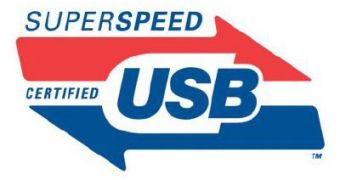One of today's most widely used connectivity interfaces is the Universal Serial Bus, better known as the USB, a technology that enables users to connect various types of devices among themselves for data transfer and power. In its current state, the technology has reached its 2.0 version, which provides users with a speed of up to 480 Mbit/s, but the industry is currently preparing for the next-generation interface, the much-anticipated USB 3.0 one. On that note, the USB Implementers Forum (USB-IF) recently announced the availability of the USB 3.0 Compliance and Certification Program, which enables adopters of the new technology to test their products to ensure compliance with the USB 3.0 specifications.
“The availability of the Compliance and Certification program is a significant milestone, and means consumers are one step closer to seeing certified SuperSpeed USB products on store shelves,” Jeff Ravencraft, USB-IF president and chair, said. “When consumers see the SuperSpeed USB logo, they will have the assurance that the product interoperates with existing USB 2.0 products and provides all the speed and power efficiency enhancements that SuperSpeed USB offers, while continuing the ease-of-use consumers have come to expect from USB.”
Announced as far back as 2007, the new USB interface is expected to provide users with an increased performance. It is reported to be capable of delivering up to ten times the speed of current USB 2.0 solutions, namely 4.8 Gbit/s, which is why the new USB 3.0 interface is being called USB SuperSpeed, compared with the USB 2.0, which was released in April, 2000 and is known as USB Hi-Speed.
According to the announcement from the USB-IF, adopters of the new USB will be able to test their devices, to meet the specifications of the new interface, at the USB Platform Interoperabilty Lan (PIL), which was launched in March, 2009. Later on, Compliance and Certification testing will be offered at USB-IF workshops and at Independent Test Labs, as is the case with the current Hi-Speed USB 2.0 program.

 14 DAY TRIAL //
14 DAY TRIAL //